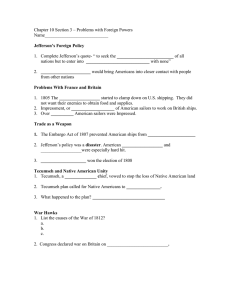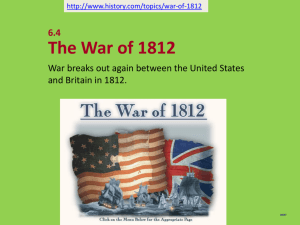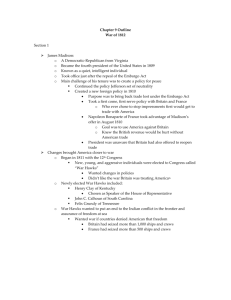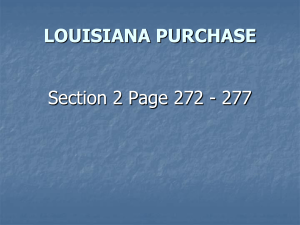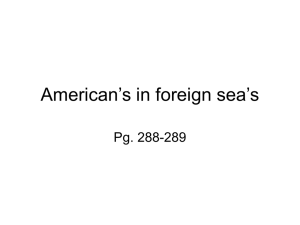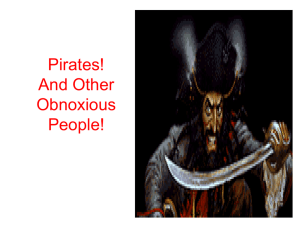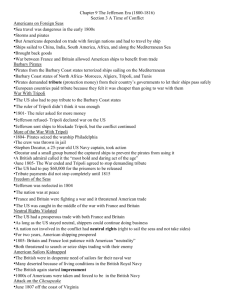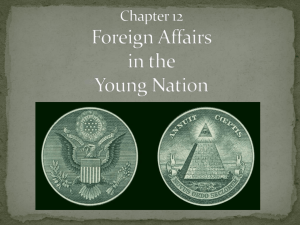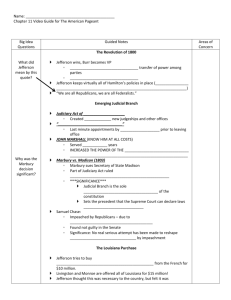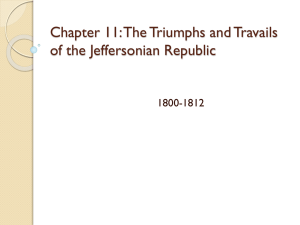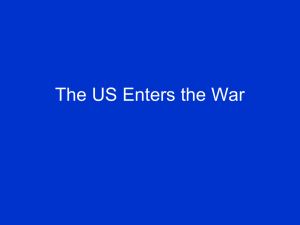War of 1812 class notes
advertisement
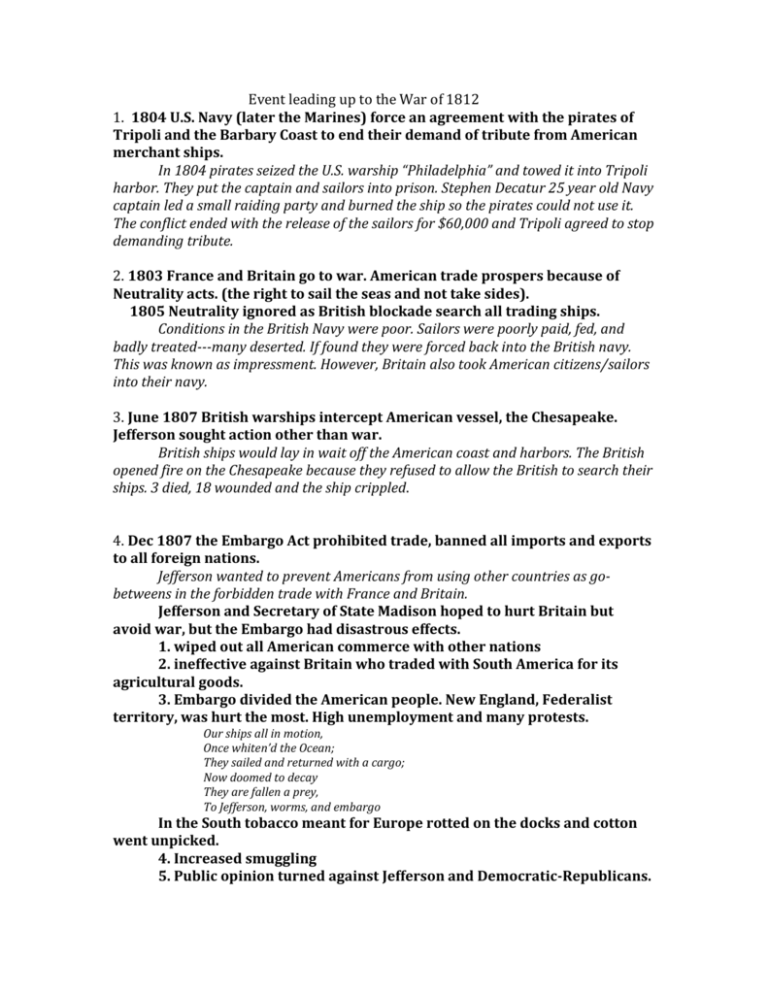
Event leading up to the War of 1812 1. 1804 U.S. Navy (later the Marines) force an agreement with the pirates of Tripoli and the Barbary Coast to end their demand of tribute from American merchant ships. In 1804 pirates seized the U.S. warship “Philadelphia” and towed it into Tripoli harbor. They put the captain and sailors into prison. Stephen Decatur 25 year old Navy captain led a small raiding party and burned the ship so the pirates could not use it. The conflict ended with the release of the sailors for $60,000 and Tripoli agreed to stop demanding tribute. 2. 1803 France and Britain go to war. American trade prospers because of Neutrality acts. (the right to sail the seas and not take sides). 1805 Neutrality ignored as British blockade search all trading ships. Conditions in the British Navy were poor. Sailors were poorly paid, fed, and badly treated---many deserted. If found they were forced back into the British navy. This was known as impressment. However, Britain also took American citizens/sailors into their navy. 3. June 1807 British warships intercept American vessel, the Chesapeake. Jefferson sought action other than war. British ships would lay in wait off the American coast and harbors. The British opened fire on the Chesapeake because they refused to allow the British to search their ships. 3 died, 18 wounded and the ship crippled. 4. Dec 1807 the Embargo Act prohibited trade, banned all imports and exports to all foreign nations. Jefferson wanted to prevent Americans from using other countries as gobetweens in the forbidden trade with France and Britain. Jefferson and Secretary of State Madison hoped to hurt Britain but avoid war, but the Embargo had disastrous effects. 1. wiped out all American commerce with other nations 2. ineffective against Britain who traded with South America for its agricultural goods. 3. Embargo divided the American people. New England, Federalist territory, was hurt the most. High unemployment and many protests. Our ships all in motion, Once whiten’d the Ocean; They sailed and returned with a cargo; Now doomed to decay They are fallen a prey, To Jefferson, worms, and embargo In the South tobacco meant for Europe rotted on the docks and cotton went unpicked. 4. Increased smuggling 5. Public opinion turned against Jefferson and Democratic-Republicans. 1809 Congress repealed the embargo act and replaced it with a much weaker Non-Intercourse Act, which prohibited trade with Britain and France and their colonies. By 1810 this act expired and was replaced by laws that would allow trade with the first country that lifted their restrictions. Napoleon of France was first, however it was a trick and France seized American ships. In the scheme of things Britain was a bigger threat. 6. Frontier conflicts as British supports the native-Americans. 1803 Ohio becomes a state, a treaty with the Indians allow Americans to settle on newly acquired 100 million acres. Shawnee Chief Tecumseh (tuh-kuhm-suh) built a confederacy among Indian tribes. Supported by the British they wanted to stop white settlements. Tecumseh allied with his brother, The Prophet, who rallied tribes in Indiana and Michigan. The Indian confederation was warned by American governor of the Indian Territory, William Henry Harrison 7. William Henry Harrison attacks the Indian Confederation, “Prophet-town” at Tippecanoe River. The Indians are defeated. It is believed by the settlers that the British guns were given to the Indians. A rallying cry of the settlers was, “on to Canada”. 8. 1810 War Hawks pressure President Madison to declare war. They reinvigorated America’s sense of nationalism. War Hawks are young republicans from the South and West. They wanted to avenge the actions of the British against Americans. The leading War Hawks were Henry Clay from Kentucky and John Calhoun from South Carolina. They urged Congress to strengthen the military. Congress quadrupled the army. Federalists in the North were strongly opposed o the war. (pro-British). 9. Spring of 1812 Madison asks for a declaration of war. In the meantime the British decided to end their policy of search and seizure of American ships, however the amount of time it took for news to travel across the ocean was too late to stop the war. 10. September 10, 1813 Commander Oliver Perry led naval forces in Lake Erie a decisive victory over the British. Perry, ”We have met the enemy and they are ours”. 11. Battle of the Thames. British and Indian allies tried to retreat from Detroit after Perry’s victory but were cut off by the Americans. Tecumseh was killed. 12. American frigates and privateers ( armed merchant or privately owned ships) were successful. American frigate, The Constitution sunk two British ships. In one battle a shot bounced off her hall and she was promptly nicknamed, “Old Ironsides”. The British strategy was a naval blockade on the east coast but to allow an opening up North. They were aware of the Federalists anti-war sentiment and were hoping to divide and conquer. 13. March 1814 Andrew Jackson attacks the Creeks and slaughters 550 men, women, and children at the Battle of Horseshoe Bend. 14. 1814 Napoleon was defeated in Europe and allowed British to go on the offensive in America British sail into Chesapeake Bay and attack Washington D.C. Dolly Madison escapes with portrait of George Washington. The British burn the White House and Capitol building, a rainstorm prevents further damage. 15. August 24, 1815 was a low point for America as the British move on to Baltimore where Americans lie in wait. Americans barricaded the roads, blocked the harbor with 13,000 militiamen. 16. British held off by ferocious bombardment from Fort McHenry in Baltimore. Attorney Francis Scott Key watched as bombs burst over Fort McHenry. “By the dawns early light” the flag was still flying over Fort McHenry. 17. In the North, General Sir George Prevost led 10,000 British troops from Canada into N.Y.S. British suffered a humiliating defeat at the Battle of Plattsburgh. 18. The British in London came to the conclusion that the war in North America was 1. too costly 2. Unnecessary because they had nothing to gain. 19. Dec 1814 The Treaty of Ghent (Belgium) Results: No Change in the border No mention of impressment Neutrality Rights were a moot issue because Napoleon and France was defeated 20. Jan 1815 Battle of New Orleans began before word of the treaty was heard. Andrew Jackson defeats British offensive. 700 British killed. Results of the War 1. Andrew Jackson becomes a national hero, which helps him become President in 1828 2. Federalists Party loses support and dies as a political power because of their ant-war stand and anti-union sentiments 3. Increased American Nationalism 4. “War Hawks” and the Republican Party are empowered . (they favored trade, Western expansion, economic development, and a storng
